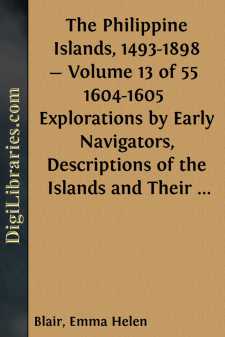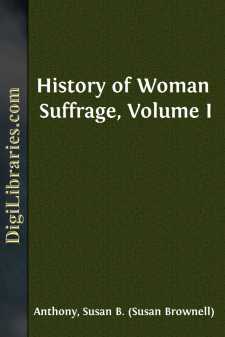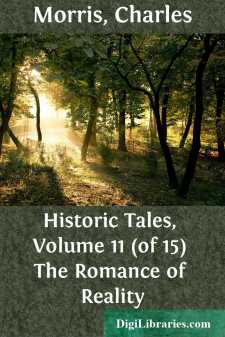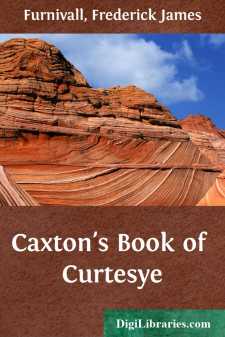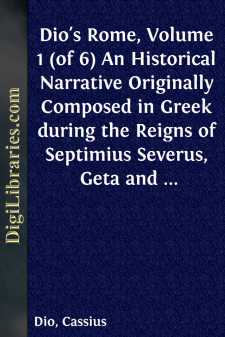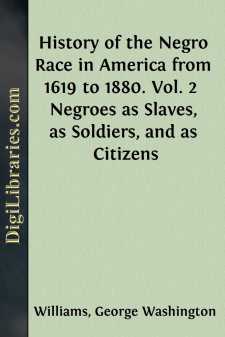History
- Africa 30
- Americas (North Central South West Indies) 50
- Ancient 68
- Asia 58
- Australia & New Zealand 8
- Canada 41
- Caribbean & West Indies 1
- Civilization 20
- Eastern Europe 12
- Europe 310
- Expeditions & Discoveries 60
- General 77
- Historical Geography 1
- Jewish 9
- Latin America 3
- Medieval 8
- Middle East 13
- Military 248
- Revolutionary 8
- Study & Teaching 5
- United States 353
- Western Europe 56
- World 13
History Books
Sort by:
by:
Emma Helen Blair
RELATION OF THE FILIPINAS ISLANDS And of What Has There Been Accomplished by the Fathers of the Society of Jesus How Father Francisco de Vera returned to España for more fathers. Chapter XXXVII. The men of the Society remained in the rest of those Pintados Islands, occupied as we have already seen. In various places, during those two years, there had been newly erected to the glory of Jesus Christ...
more...
PRECEDING CAUSES. As civilization advances there is a continual change in the standard of human rights. In barbarous ages the right of the strongest was the only one recognized; but as mankind progressed in the arts and sciences intellect began to triumph over brute force. Change is a law of life, and the development of society a natural growth. Although to this law we owe the discoveries of unknown...
more...
by:
Charles Morris
HOW ROME WAS FOUNDED. Very far back in time, more than twenty-six hundred years ago, on the banks of a small Italian river, known as the Tiber, were laid the foundations of a city which was in time to become the conqueror of the civilized world. Of the early days of this renowned city of Rome we know very little. What is called its history is really only legend,—stories invented by poets, or ancient...
more...
CHAPTER I AT HOME—1914-1915 August 4th, 1914, marks the end and also the beginning of two great epochs in the history of every Territorial Unit. It marked the close of our peace training and the beginning of thirteen months' strenuous war training for the thirty-seven months which we were to spend on active service abroad. The Fiery Cross which blazed across the entire Continent caught most...
more...
PREFACE Though no excuse can be needed for including in our Extra Series a reprint of a unique Caxton on a most interesting subject, yet this Book of Curtesye from Hill's MS. was at first intended for our original series, I having forgotten lately that Caxton had written to 'lytyl Iohn,' though some months back I had entered the old printer's book for my second collection of Manners...
more...
CHAPTER I THE PROTESTANT REVOLUTION 1540-1553 Cromwell and the Monarchy. At the death of Cromwell the success of his policy was complete. The Monarchy had reached the height of its power. The old liberties of England lay prostrate at the feet of the king. The Lords were cowed and spiritless; the House of Commons was filled with the creatures of the Court and degraded into an engine of tyranny. Royal...
more...
by:
Various
The Memoirs, of which a new translation is now presented to the public, are the undoubted composition of the celebrated princess whose name they bear, the contemporary of our Queen Elizabeth; of equal abilities with her, but of far unequal fortunes. Both Elizabeth and Marguerite had been bred in the school of adversity; both profited by it, but Elizabeth had the fullest opportunity of displaying her...
more...
by:
Cassius Dio
Four hundred and seven small pages, over and above the Epistle Dedicatory, are contained in Volume One. Really, however, this is not the true Dio at all, but merely his shadow, seized and distorted to satisfy the ideas of his epitomizer, the monk Xiphilinus, who was separated from him by a thousand years in the flesh and another thousand in the spirit. Of the little specimens here and there translated...
more...
CHAPTER I. 1800-1825. Commencement of the Nineteenth Century.—Slave Population of 1800.—Memorial Presented to Congress calling Attention to the Slave-trade to the Coast of Guinea.—Georgia cedes the Territory lying West of her to become a State.—Ohio adopts a State Constitution.—William Henry Harrison appointed Governor of the Territory of Indiana.—An Act of Congress prohibiting the...
more...
I Had you been in Paris late in the afternoon of Monday, August third, nineteen fourteen, you might have seen a slight man, whose reddish face was adorned with a thick white mustache, walk out of the German Embassy, which was situated on the Rue de Lille near the Boulevard St. Germain. Along the boulevard and across the Pont de la Concorde he walked in a manner calculated to attract attention. He...
more...


